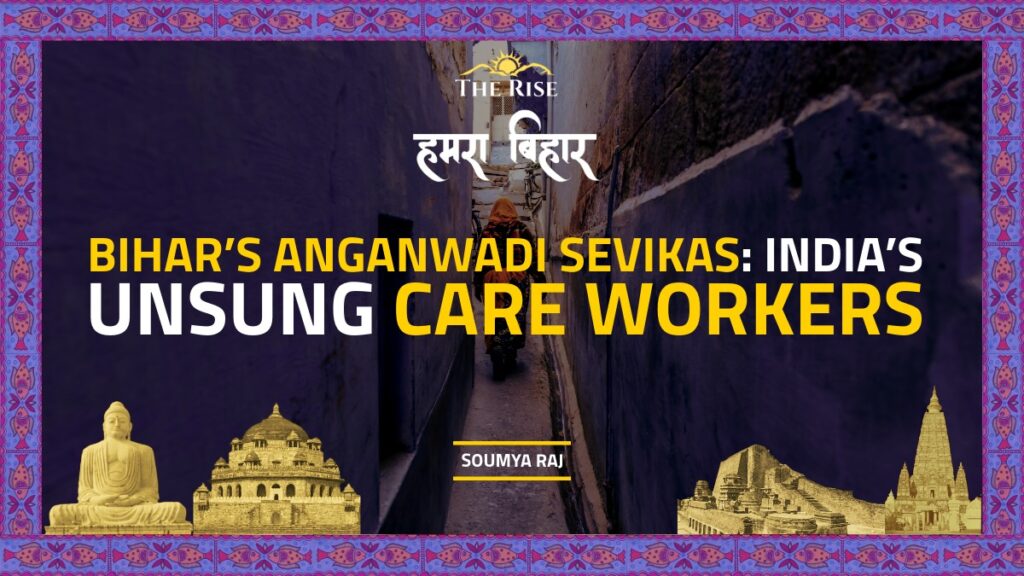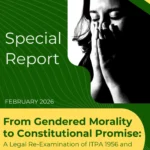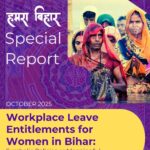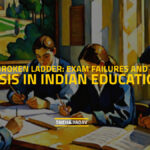The Anganwadi Sevikas (AWWs) in Bihar, numbering over 1.12 lakh, are the frontline functionaries of the Saksham Anganwadi and Poshan 2.0 scheme, the Government of India’s flagship programme for early childhood care and nutrition. Yet, despite their vital role, these Anganwadi Sevikas are not recognised as government employees and are left without any access to job security, pensions, or gratuity benefits.
In the heart of Bihar’s Nalanda district, where endless fields meet crumbling roads, the quiet backbone of India’s welfare state stands at work- the Anganwadi Sevikas. Among them is 32-year-old Sushila Devi, who begins her day before sunrise, stirring porridge for the children of her village before heading to record nutrition data on her worn-out register. Her life is stitched together by service to the state, to her village, and to her own fragile hopes.
“Sarkar aur gaon ke liye toh main hamesha taiyaar rehti hoon, par mere apne chaar bachche hi zindagi jeene ke liye lad rahe hain,” she says softly. (I am always ready for the government and the village, but it is my four children who are fighting to live.) Her eldest son dreams of becoming an engineer. “Par coaching aur college ka paisa kaun de?” (But who will pay for the coaching and college fees?) she asks, with tears in her eyes.
The Anganwadi Sevikas (AWWs) in Bihar, numbering over 1.12 lakh, are the frontline functionaries of the Saksham Anganwadi and Poshan 2.0 scheme, which is the Government of India’s flagship programme for early childhood care and nutrition. At the grassroots, these Sevikas deliver critical services from supplementary nutrition and pre-school education to health check-ups, and digital record-keeping through the Poshan Tracker app. They ensure that the last mile of the welfare actually reaches India’s poorest families.
Yet, despite their vital role and being the very face of this flagship national programme, they are not recognised as government employees. Instead, they are designated as “honorary workers,” and are left without any access to job security, pensions, or gratuity benefits.
The recent hike in honorariums from ₹7,000 to ₹9,000 for Sevikas and from ₹4,000 to ₹4,500 for Sahayikas brought relief rather than celebration. For many, it meant a slight easing of burden, not liberation from it. “In times of rising food prices, school fees, and medical costs, this 2000 bonus disappears even before we realize,” says Sushila Devi. Even as the government framed the hike as recognition of their “invaluable contribution,” most workers saw it as a long-overdue correction, rather than a real valuation of their labour.
This modest pay rise forms a part of their longer struggle for dignity and recognition. In 2023, thousands of Anganwadi workers across Bihar launched a 71-day statewide strike demanding fair honorariums, recognition as government employees, pension security, a higher retirement age, and gratuity benefits. These demands were rooted in decades of structural inequalities and the chronic undervaluation of women’s care work. Against this backdrop, the recent wage hikes and symbolic acknowledgments appear less as benevolence and more as the hard-earned results of sustained collective struggle.
For women like Sushila, Anganwadi centres are far more than a workplace. They are spaces where a toddler learns to pronounce her first letters, where a mother recognizes the signs of malnutrition, and where an adolescent girl finds safe conversations about her changing body. Across Bihar’s 1.2 lakh centres, Sevikas like her translate government schemes into lived care. Poonam Devi of Nalanda, for example, led campaigns during Poshan Maah that reportedly reduced malnutrition rates in her village (Poshan Tracker Report, 2024). “Main Sevika nahi hoon, main Shakti hoon,” she says, reflecting the significance of these grassroots foot-workers of India.
“Inn bacchon ko dekh kar himmat aayi,” says Sushila, recalling how returning to the Anganwadi after her husband’s death during COVID-19 gave her a reason to endure. For her, the centre is more than a workplace; it is a refuge of purpose. Each morning, as she serves porridge, the children calling her “Didi” remind her that her presence matters to them. Yet the tenderness of that role often collides with her own reality, where she struggles to fulfill even the necessities of her family.
The challenges extend beyond her home. Many centers operate in makeshift tin sheds or unfinished rooms, often without clean water, toilets, or safe play areas for children. In Nawada (2024), several children fell ill after consuming khichdi from an Anganwadi kitchen that lacked proper storage and hygiene facilities (District Health Report, 2024).“Kaam humse poora chahte hain, par zariya aadha dete hain,” Sushila remarks. (They want us to deliver fully, but give us only half the resources.)
Beyond these hardships lie social barriers. Many Sevikas must negotiate household resistance to continue their work. Jyoti Kumari from Darbhanga, for instance, completed her schooling only after becoming a Sevika, defying her husband’s objections. These women challenge patriarchal boundaries not through confrontation, but through consistent, visible, irrefutable usefulness.
Yet, the truest measure of their work is not found in data sheets or protest placards but in the smallest and most ordinary moments of recognition. During a recent school uniform distribution drive organized in collaboration with Jeevika, Sushila recalls a quiet, thin little boy who lingered at the back of the line. When he finally wore his new uniform, he looked at himself, smoothed the collar, and smiled — wide, unguarded, proud. Watching him, Sushila felt something shift inside her. “For us, it was just a uniform, but for them, it’s their identity,” she says softly. That smile reminded her why her work matters, even when the world forgets to notice.
Anganwadi workers like Sushila are not merely executing state directives; they are the invisible thread binding policy and people. In their quiet persistence lies a truth about India’s welfare system whose foundation rests on the underpaid, overburdened, yet unyielding strength of women like them. They are not just Sevikas; they are the living force of Shakti.
Soumya Raj is a TRIP Intern under Hamra Bihar
Mentored and edited by Sneha Yadav.
References
- Government of Bihar. Honorarium Revision Announcement, 2024.T
- The Hindu. “Bihar Anganwadi Workers End 71-Day Strike,” December 2023.
- Poshan Tracker & MoWCD. Poshan Maah Impact Reports, 2024.
- District Health Office, Nawada. Food Contamination Incident Report, 2024.
- Patna Press. “Jeevika to Provide School Uniforms to Anganwadi Children,” 2024
About the author
Soumya Raj, a Sociology postgraduate, is driven by a commitment to learning, collaboration, and meaningful research.Currently, she is a TRIP intern.
-
This author does not have any more posts.
Sneha Yadav is an electronics engineer with a postgraduate degree in political science. Her interests span contemporary social, economic, administrative, and political issues in India. She has worked with CSDS-Lokniti and has been previously associated with The Pioneer and ThePrint.
-
Sneha Yadav
-
Sneha Yadav
-
Sneha Yadav
-
Sneha Yadav
-
Sneha Yadav
-
Sneha Yadav
-
Sneha Yadav
-
Sneha Yadav
-
Sneha Yadav
-
Sneha Yadav
-
Sneha Yadav
-
Sneha Yadav
-
Sneha Yadav
-
Sneha Yadav
-
Sneha Yadav
-
Sneha Yadav
-
Sneha Yadav
-
Sneha Yadav
-
Sneha Yadav
-
Sneha Yadav
-
Sneha Yadav
-
Sneha Yadav
-
Sneha Yadav
-
Sneha Yadav
-
Sneha Yadav
-
Sneha Yadav
-
Sneha Yadav
-
Sneha Yadav
-
Sneha Yadav
-
Sneha Yadav
-
Sneha Yadav









































































